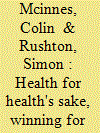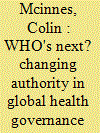| Srl | Item |
| 1 |
ID:
141059


|
|
|
|
|
| Summary/Abstract |
Ideas of smart power and Global Health Diplomacy have developed considerable prominence over the past decade in, respectively, the foreign policy and public health communities. Although in some respects separate, both suggest the potential for using health assistance to generate political as well as health benefits. The conflicts in Iraq and Afghanistan provide an opportunity to examine these assertions at the ‘sharp end’. We consider both the health and wider strategic benefits of health assistance in these conflicts, as well as some of the ethical challenges involved. We conclude however that we should adopt the precautionary principle because: there is doubt over the quality of health services provided in such circumstances; concern over the wider effects of politicising health aid; and little proof that the claimed strategic benefits materialise in practice.
|
|
|
|
|
|
|
|
|
|
|
|
|
|
|
|
| 2 |
ID:
142430


|
|
|
|
|
| Summary/Abstract |
The World Health Organization (WHO) occupies a central place in the system of global health governance and plays a key role in the control of epidemics and pandemics. The 2014 Ebola crisis in West Africa, however, saw widespread and sustained criticism of its performance, leading many to call for its reform and even replacement. This article moves on from initial analyses of the WHO's ‘failure’, to argue that the crisis has led to a shift in its authority as a global governor. It argues that the WHO's traditional basis of authority was largely expert and delegated; that it provided technical advice and normative guidance, and that its authority was ‘on loan’ from member states, who exerted considerable influence over the WHO. Its actions during the West African Ebola outbreak remained consistent with this, but it was unable to cope with what the outbreak required. The criticisms both of the WHO and the wider system of global health governance, however, have opened up a space where the balance of authority is shifting to one based more heavily on capacity—the ability to act in a crisis. If such a shift is realized, it will create different expectations of the WHO which, if they are not fulfilled, may lead to trust in the organisation declining and its legitimacy being compromised.
|
|
|
|
|
|
|
|
|
|
|
|
|
|
|
|